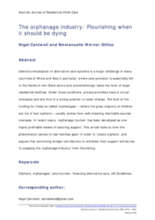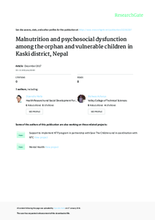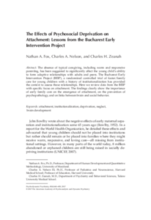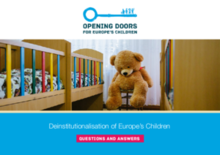Displaying 311 - 320 of 773
The purpose of this study was to understand the perspective of caregivers about the formation and disruption of bonds with institutionalized children in Brazil.
Exploring the testimonials collected during a focus group and 45 individual interviews with adult alumni of such institutions the Romanian research team enrolled in the SASCA Project revealed a wide range of forms of violence and traumatic consequences.
This study examines adult outcomes of youths (N=251) who spent time in a Dutch judicial treatment institution.
This article looks at how the orphanage industry serves to tear families apart in order to ‘create orphans’, and argues that convincing foreign contributors to withdraw their support will be key to stopping the ‘orphanage industry’ from flourishing.
The objective of this study was to assess malnutrition and psychosocial dysfunction among vulnerable children as well as to determine the association between malnutrition and psychosocial dysfunction among orphan and vulnerable children in Kaski district, Nepal.
This article presents the findings of a study that examined the emotional health status and coping mechanisms of adolescents living in residential care facilities in Malaysia, in comparison with that of adolescents living in families.
The Bucharest Early Intervention Project (BEIP), a randomized controlled trial of foster/family care for young children with a history of institutionalization has provided the context to assess these relationships. This article reviews data from the BEIP with specific focus on attachment.
This resource provides quick answers to some of the frequently asked questions about the transition from institutional to family- and community-based care for children, also known as deinstitutionalisation (DI).
To accompany the release of the learning guide “Deinstitutionalisation of Europe’s Children: Questions and Answers”, the Opening Doors for Europe’s Children has prepared an online quiz to test the knowledge and tackle some of the tricky questions on deinstitutionalisation (DI).
This session of the World Travel Market in London focused on orphanage tourism and featured speakers from the Better Volunteering Better Care Initiative and other partners, including Save the Children, Friends International, Lumos, and People and Places.




